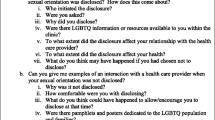Abstract
Lesbian, gay, and bisexual people are often hesitant to reveal their sexual identities to health care providers for fear of poor care. This study begins to explore some of the factors related to disclosure, including the prevalence of different kinds of disclosure/nondisclosure and the frequency of protective strategies in health care settings. Eighty-eight LGB people (38 lesbians, 37 gay men, and 13 bisexuals) responded to a questionnaire about their most recent experiences with health care as well their overall experiences. More respondents reported avoiding questions about sexuality (38%) than actively disclosed to their health care provider (37%). These respondents reported a wide range of protective strategies in health care settings, with women reporting use of more strategies in past health care experiences than men. Women were also more likely to have a regular physician and to disclose sexual identity to a health care provider than were men. Many respondents gave examples of unpleasant interactions with health care providers or reported that health care providers made heterosexist assumptions. Rates of disclosure to health care providers remain low because lesbian, gay, and bisexual people still perceive health care settings and providers as threatening.
Similar content being viewed by others
REFERENCES
Stevens PE, Hall JM. Stigma, health beliefs, and experiences with health care in lesbians. Image 1988;20(2):69–73.
Cramer DW, Roach AS. Coming out to mom and dad: A study of gay males and their relationships with their parents. J Homosex 1988;15(3/4):79–91.
Miranda J, Storms M. Psychological adjustment of lesbians and gay men. J Counsel Dev 1989;68:41–45.
Murphy BC. Lesbian couples and their parents: The effects of perceived parental attitudes on the couple. J Counsel Dev 1989;68:46–51.
Wells JW, Kline WB. Self-disclosure of homosexual orientation. J Soc Psychol 1987;127:191–97.
Tellez C, Ramos M, Umland B, Palley T, Skipper B. Attitudes of physicians in New Mexico toward gay men and lesbians. J Gay Lesbian Med Assoc 1999;3(3):83–90.
Douglas CJ, Kalman CM, Kalman TP. Homophobia among physicians and nurses:Anempirical study. HospCommunPsychiatry 1985;36(12):1309–11.
Eliason MJ, Donelan C, Randall C. Lesbian stereotypes. Health Care Women Int 1992;13:131–44.
Mathews C, Booth M, Turner J, Kessler L. Physicians attitudes toward homosexuality: Survey of a California county medical society. West J Med 1986;144(1):106–10.
Dardick L, Grady K. Openness between gay persons and health professionals. Ann Internal Med 1980;93(I):115–19.
Martinson JC, Fisher DG, DeLapp TD. Client disclosure of lesbianism: A challenge for health care providers. J Gay Lesbian Soc Serv 1996;4(3):81–94.
Johnson SR, Guenther S, Laube D, Keettel W. Factors including lesbian gynecologic care:Apreliminary study.AmJ Obstet Gynecol 1981;140(1):20–28.
Cochran S, Mays VM. Disclosure of sexual preference to physicians by Black lesbian and bisexual women. West J Med 1988;149:616–19.
Harvey SM, Carr C, Bernheine S. Lesbian mothers: Health care experiences. J Nurse-Midwifery 1989;34(3):115–19.
Eliason MJ, Morgan KS. Lesbians and physical health care seeking. Unpublished manuscript, University of Iowa College of Nursing, Iowa City, Iowa, 1996.
Hitchcock JM, Wilson HS. Personal risking: Lesbian selfdisclosure of sexual orientation to professional health care providers. Nursing Res 1992;41(3):178–83.
Stevens PE. Protective strategies of lesbian clients in health care environments. Res Nursing Health 1994;17:217–29.
Eliason MJ. Who cares? Institutional barriers to health care for lesbian, gay, and bisexual persons. NewYork: National League for Nursing Press, 1996.
Chaimowitz GA. Homophobia among psychiatric residents, family practice residents, and psychiatric staff. CanJ Psychiatry 1991;36(3):206–9.
Author information
Authors and Affiliations
Corresponding author
Rights and permissions
About this article
Cite this article
Eliason, M.J., Schope, R. Original Research: Does “Don't Ask Don't Tell” Apply to Health Care? Lesbian, Gay, and Bisexual People's Disclosure to Health Care Providers. Journal of the Gay and Lesbian Medical Association 5, 125–134 (2001). https://doi.org/10.1023/A:1014257910462
Issue Date:
DOI: https://doi.org/10.1023/A:1014257910462




